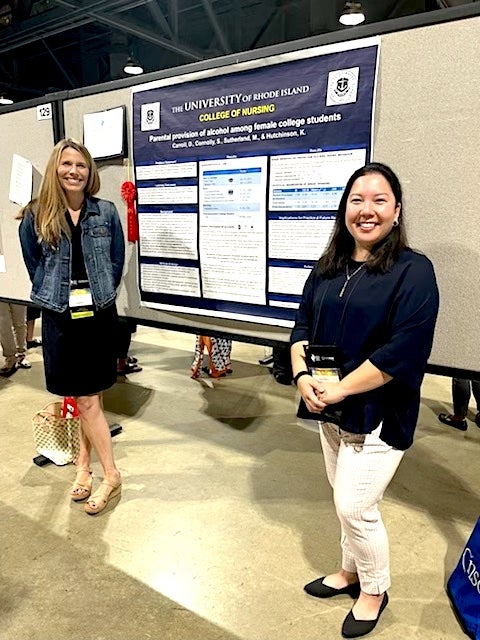Two Nursing PhD students win national award for study analysis on risky behavior
Studies suggest that parents continue to exert significant influence over their children’s behavior even into the college years, and that extends into the choices they make regarding substance use and other risky behaviors. When parents encourage, or at least don’t discourage, underage drinking, their children tend to drink more, which can lead to further consequences, according to a recent University of Rhode Island College of Nursing student study.
Ph.D. students Devon Carroll and Somatra Connolly — both Cynthia & Thomas Sculco Graduate Nursing Research scholars — examined the parental provision of alcohol to college students, and the impact that has on student binge drinking and other risky behaviors, particularly among women, who are especially vulnerable to adverse experiences from risk-taking behaviors. They found that when parents give their college-age children alcohol, those students tend to engage in binge drinking more frequently, which can lead to other negative outcomes.
“To date, no studies have directly examined the association between the parental provision of alcohol to college students and their subsequent alcohol use, sexual risk and other adverse experiences,” wrote the students, who presented their analysis at the American Psychiatric Nurses Association Annual Conference in Long Beach, Calif, winning a second-place award. “The purpose of this study was to examine the association between parental provision of alcohol and alcohol use and binge drinking in female college students. Binge drinking was also explored as a predictor for other risk behaviors and negative health outcomes.”
Analyzing data from a survey of nearly 500 college-age women in their first or second year at two universities — conducted by URI Professors Kathy Hutchinson and Melissa Sutherland in 2021 as part of their study, “College Living and Well-being Before and During the COVID-19 Pandemic” — Carroll and Connolly found that about 15 percent of students reported that their parents provided alcohol during the current year of college. Participants answered questions about demographics, parental provision of alcohol, alcohol use, binge drinking, stress, general health, sexual behaviors and experiences with violence. Those students whose parents gave them alcohol tended to drink twice as often per month than those whose parents did not, and they tended to binge drink twice as often, as well.
This study utilized Bronfenbrenner’s Ecological Systems Theory (1979), which provides a lens through which to understand behavior during emerging adulthood, given the uniqueness of this developmental period. It found that when such young adults engage in binge drinking, other dangers can follow. The study associates binge drinking with forced sexual contact, physical intimate partner violence, and negative mental health outcomes, and recommends intervention for college-bound students and their parents.
“Larger studies investigating parental provision of alcohol, alcohol use, sexual behaviors and violence experiences in female undergraduate students are needed,” Carroll and Connolly wrote, suggesting younger students should also be studied. “Further studies should examine the role of parent provision of alcohol in high school and binge drinking and alcohol misuse in female college students.”

